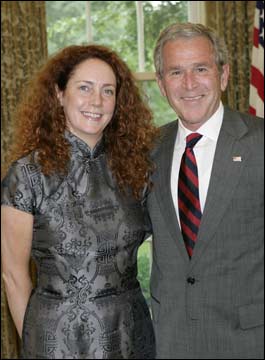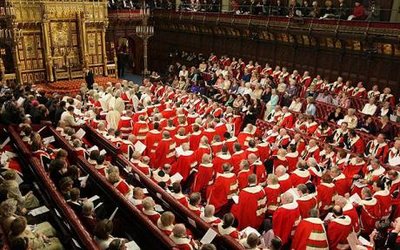
There is perhaps though another reason why Wade has not ventured into the public gaze for the past few years, which quickly becomes apparent when you read the actual content of her speech: she has nothing of any great interest to say. You don't need to be an intellectual to edit an newspaper, and Wade is probably excellent at what she does, but an orator or a debater she is obviously not. Compared to Paul Dacre, who likewise is supposedly shy of the limelight, his speeches, which included the very same lecture a couple of years back, are furious and infuriating by equal measure. He might be completely wrong, and arrogant and insulting with it, but he can argue his point well enough. Wade however lacks the courage or self-belief to adequately cover the contradictions throughout, leaving gaping holes in her material.
She might well have been then as Roy Greenslade suggests, charming in person, but none of that comes across in the somewhat disjointed full text offered by both the Guardian and the Press Gazette. Starting on somewhat surer ground, she illustrates that those cutting costs without reinvesting the savings back into journalism itself are the ones that are losing the most sales. Unsurprisingly, the Mirror and the Daily Star are the ones that have lost the most sales over the past year. Even this though leaves out some other much needed explanatory detail: Wade doesn't mention that her own paper has reignited the vicious price war, with the paper selling for just 20p across London and the south-east. As has been noted time and again, because of Murdoch's other vast interests, he can afford to do so; his competitors simply can't, and attempting to compete is beyond stupid. Naturally, Richard Desmond has therefore slashed the cost of the Star to... 20p. Although December is always a quiet month for newspapers sales, the Sun fell below 3 million last month, just as it did in 2007. Across the board though all of the tabloids are declining, and falling at far faster rates than their broadsheets rivals and sisters. It indicates the inevitable: that as the internet increasingly takes over as the main source for the celeb tittle-tattle, scandal-mongering and populist wittering which they specialise in, the tabloids are facing the end of their business models. The broadsheets, by contrast, although still giving away their content, can survive thanks to their quality and reader dedication, which simply isn't there among the red-tops and middle-market.
Wade's rallying cry then, that it will be "the quality of our journalism [that] makes or breaks our industry, not the recession", is one of those statements that makes you wonder if she really knows what she's saying. Just the recent Glen Jenvey incident, when the paper splashed on a complete untrue concocted story which accused completely innocent Muslims of being extremists, shows how much it cares about accuracy. It's no surprise to learn that a new poll found that only 19% of those questioned in this country had trust in newspapers. This is a direct consequence of the tabloids' often irresponsible and downright untrue journalism, which unfairly infects opinion of other newspapers and broadcasters, yet still editors like Dacre and Wade defend their "quality" despite its effects.
Wade's second theme, campaigning journalism, offers us her insight into both the recent Baby P affair and the more notorious "naming and shaming" of paedophiles she directed while editor of the News of the World, but first she mentions the paper's continuing support for the Help for Heroes charity, including her own trip to a base in Helmand. She describes a warm welcome and how everyone was wearing the wristbands, but this jars somewhat with the far more cynical views of the newspaper on the Army Reserve Rumour Service message board in response to the paper's Military Awards, which Wade also mentions, and which readers themselves also seemed less than overwhelmed with. She takes credit for the increasing support for the army and turnout at parades, without providing any evidence whatsoever that it was the Sun "wot did it". Similarly, while she calls for more reporting of the war in Afghanistan, she doesn't mention that her paper's own coverage of it never for so much of a second doubts that it's for a good cause or that the battle is being won. Whenever the topic is discussed in the paper's leader column, it inevitably turns to the argument that fighting the Taliban makes us safer, when again there is evidence to suggest the opposite is the case. Blind loyalty is all that it has to offer, when constructive criticism is always the best policy.
Moving on to Sarah's law, what becomes clear is Wade's utter refusal to take responsibility, both for her own actions, and also for the actions of those who read her newspaper and decide to take the law into their own hands. Illuminating firstly is that it came about after she arrived unannounced on Sara Payne's doorstep; not apparently concerned about whether either she or her husband were in a fit state to be interviewed, or to set in motion what became a crusade which if implemented would most likely have the opposite effect to that which is intended, Wade immediately had her witch-hunt. Her own contempt for the truth is also apparent when she castigates the other media for its reporting of what happened on one Portsmouth estate:
Parts of the media went on the attack with a blatant disregard for the facts of the campaign or more importantly their readers’ opinions on the matter.
After we published the first list, a group of mothers from an impoverished housing estate in Portsmouth took to the streets to protest. The BBC described them as ‘an angry lynch mob’.
What the BBC did not report was that the mothers had just discovered that Victor Burnett, a paedophile with 14 convictions for raping and abusing young boys between the ages of four and nine, had been rehoused amongst them unmonitored by the authorities.
Totally unaware of his background, the residents had complained for years about Burnett’s inappropriate behaviour towards their children but their voices, until then, had remained unheard.
How else should the media have described protests such as these, as reported by the Telegraph:
The torch paper was lit by the naming of Victor Burnett, a convicted serial child abuser, in the News of the World: he was a resident of Paulsgrove and was hounded from his home by a chanting mob. Events moved out of control: the rest of Britain looked on in horror and fascination as windows were smashed, cars burned, and angelic, banner-waving five-year-olds happily chanted words that sounded ugly falling from childish mouths. "Sex case, sex case. Hang 'em, hang 'em, hang 'em." Five families were moved from the estate: the police said that none had links with sex offences.
There was no evidence that Burnett had re-offended while on Paulsgrove, but at least he was correctly identified: others had their houses burgled, windows smashed and their cars set on fire. Wade calls the "naming and shaming" her responsibility, which it was. She however hides behind the readers themselves, critical of how others disregarded "readers' opinions", as if readers' opinions are always unimpeachable or always right. As Nick Davies pointed out in Flat Earth News, one of the rules of production is giving the readers what they want, but what you think the readers want is not always the same thing. The key is that it's cheap, while challenging orthodoxy is expensive and unpredictable.
That Wade has no interest in the ultimate consequences of her own actions could not be more illustrated by the end result of the paper's Baby P campaign. Here's how she describes it:
Campaigns provide a unique connection to the public especially when the subject matter is of a serious nature.For me, nothing can illustrate this connection better than our recent Baby P campaign.
The public outcry was deafening. And we began our fight for justice with a determination to expose the lack of accountability and responsibility for Baby P’s brutal death.
We delivered 1.5 million signatures to Downing Street and the collective power worked.
Children’s Secretary Ed Balls was forced to use emergency legislation to ensure that those responsible were held to account. We received many many thousands of letters at The Sun about our Baby P coverage.
I’d like to read you one: ‘I have never been a huge fan of The Sun, however I thank you for the coverage of Baby P. I am so grateful for the campaign. This is not a modern day witch-hunt but a petition for justice. Please, please do not relent.'
In contrast, I’d like to quote from an article in... The Guardian.
“Full of fury and repellent hysteria, but isn’t that part of the game? This is less about the creation of public emotion and more about its manipulation."
This knee-jerk tabloid kicking reaction is just dull.
But total disregard and respect for public opinion never ceases to amaze me.
They demanded accountability.
And as a result of the campaign, some, just some, of those responsible were removed from office without compensation.
Or as this Sun reader wrote: ‘The tabloid press, which the arty-farty press like to look down on so much, has shown that it prides morality over political correctness.’
Again, there's the lack of evidence that Shoesmith and others wouldn't have been suspended or sacked if the Sun hadn't ran its campaign. Some sort of action was always going to be taken. Again, Wade hides behind supposed public opinion: it's what "they" want, not what she wants or what's good for Murdoch's bank balance. It's not about directing the blame onto other people because those actually responsible for Baby P's death couldn't be named and demonised themselves because the cogs of justice are still whirring in connected cases, it's about so-called justice, or even morality. The result? A new boss has been installed in Haringey, on double what Sharon Shoesmith was earning, while the borough is now so desperate for social workers that the head of the department made an appeal across London for some to be lent him. Children less safe, those who worked on the case who were already likely distraught had their lives ruined, and now the service, what's left of it, costs more. A more ringing endorsement of a Sun justice campaign could hardly be imagined, and yet still Wade feels fit to quote a reader who invokes morality. This so-called morality was presumably what lead the comment sections on the Sun's articles to be shut down, where previously already suicidal social workers had been encouraged to kill themselves. The only more immoral paper in this country is the Daily Mail.
Filled with such chutzpah, it's little wonder that Wade then goes on to make an even more outrageous statement, this time involving press freedom:
This country is full of regulators, lawyers and politicians eager to frame and implement legislation that would constrain freedoms hard won over centuries.
We are already losing those freedoms. Privacy legislation is being created by the drip, drip of case law in the High Court without any reference to parliament.
This from the editor of an newspaper which as the Heresiarch has already pointed out, has never so much as raised its voice once against this government's incessant attacks on civil liberties. In fact, on nearly every occasion it's supported them, whether it be ID cards, detention without trial or its constant bugbear, the Human Rights Act, which it opposed while the government introduced it. She's also completely wrong: parliament passed the HRA, which now so apparently threatens the tabloids' and their dying business model by potentially restricting the scandals they can report. This is also an issue on which public opinion is not necessarily on their side: few cared about Max Mosley, or even knew who he was until the News of the World exposed him while blackmailing the women who spanked him. The HRA doesn't affect real scandal, like the already monikered "Erminegate", which is why no one other than the tabloids and their editors care, and why the Guardian was completely right to print Mosley's own views on press freedom, which she criticises, no doubt intending to be humourous, as "self-flagellation". When she talks about quality, a old man being spanked by prostitutes is the sort of story she means.
Having regaled stories about how much the Sun listens to its readers, she concludes with a few questions which can be happily answered:
We need to ask ourselves: Can we unite to fight against a privacy law that has no place in a democracy?
Obviously not, as firstly there isn't one, isn't going to be one, and even if there was, it wouldn't be supported when it would only cover sex scandals involving celebrities. Next!
Can we agree that self-regulation is the best way to deal with the occasional excesses of a free press?
No, not when the regulator is completely toothless and cannot impose financial sanctions or front page apologies on newspapers when the "excesses" are serious enough, as they often are.
Can we have a press that has the courage and commitment to listen to and fight for its readers?
Not when no thought is put into whether the consequences of that courage and commitment will actually result in a positive outcome.
Can we survive this economic climate if we keep investment in journalism at the heart of what we do?
Not if what you call journalism is whatever's on the front page of tomorrow's Sun (Jade Goody and a footballer being interviewed about a rape).Labels: Baby P, fisks, journalism, media analysis, paedophile hysteria, privacy law, Rebekah Wade, Sarah's law, Scum-watch, Sun-watch, tabloid mendacity




